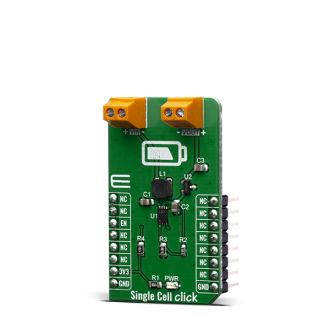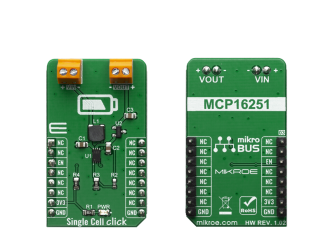
We strongly encourage users to use Package manager for sharing their code on Libstock website, because it boosts your efficiency and leaves the end user with no room for error. [more info]

Rating:
Author: MIKROE
Last Updated: 2019-11-14
Package Version: 1.0.0.0
mikroSDK Library: 1.0.0.0
Category: Linear
Downloaded: 4101 times
Not followed.
License: MIT license
The Single Cell click is a Click board which features MCP16251 synchronous boost regulator with true load disconnect and MCP1811A low-dropout (LDO) linear regulator that provide an ultra low quiescent current during device operation of about 250nA and can be shut down for 5nA (typical) supply current draw.
Do you want to subscribe in order to receive notifications regarding "Single Cell click" changes.
Do you want to unsubscribe in order to stop receiving notifications regarding "Single Cell click" changes.
Do you want to report abuse regarding "Single Cell click".


Library Description
The library covers all the necessary functions to control Single Cell Click board. The library contains a function which enable or disable the regulator output switching.
Key functions:
void singlecell_enable() - Enable the regulator output function.void singlecell_disable() - Disable the regulator output function.Examples description
The application is composed of three sections :
void applicationTask()
{
char receivedData;
if ( UART_Rdy_Ptr() )
{
receivedData = UART_Rd_Ptr();
switch ( receivedData )
{
case 'E' :
{
singlecell_enable();
mikrobus_logWrite( " Enable regulator output ", _LOG_LINE );
mikrobus_logWrite( "-------------------------", _LOG_LINE );
break;
}
case 'D' :
{
singlecell_disable();
mikrobus_logWrite( " Disable regulator output", _LOG_LINE );
mikrobus_logWrite( "-------------------------", _LOG_LINE );
break;
}
}
}
}
Other mikroE Libraries used in the example:
Additional notes and informations
Depending on the development board you are using, you may need USB UART click, USB UART 2 click or RS232 click to connect to your PC, for development systems with no UART to USB interface available on the board. The terminal available in all MikroElektronika compilers, or any other terminal application of your choice, can be used to read the message.